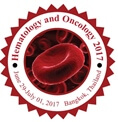Naser Mobarra
University of Medical Sciences, Iran
Title: Stem Cell Transplantation, A new treatment for Blood Cancer Patients
Biography
Biography: Naser Mobarra
Abstract
Cancer is a major cause of death in the world today. The International Agency for Research of Cancer estimated that 94.4 thousands deaths would occur in 2012 due to blood cancer in the countries of the European Union.
All cancers demand new treatments, and we focus on specific type of cancer: blood cancers or haematological malignancies. There are four broad categories of blood cancers: leukaemia, myeloma, Hodgkin lymphoma and non-Hodgkin lymphoma. Together, these account for around 9 % of all cancers and are currently the fourth most common in both males and females in the world
Because of this high mortality rate, the development and progressive evolution of stem cell transplantation in recent decades has been an important medical advance. haematopoietic stem cell transplantation (HSCT) has become an effective treatment for malignant and benign haematological diseases that could not be cured by other therapies, allowing for an increasing number of patients to become long-term survivors. It is an essential part of the therapeutic strategy which is clinically recommended for blood cancer patients whose clinical condition indicates transplantation.
Hematopoietic stem cells (HSCs) are found at the apex of this system and are defined by their ability to self-renew and to give rise to all hematopoietic lineages.HSCs can be identified through the expression of CD34 on their surface and a lack of expression of CD38.

